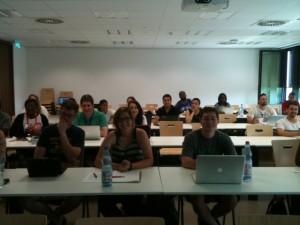People in the Chicago Megacity, defined as the 21-county region stretching from the Milwaukee area down through Chicago into Northwest Indiana, need to work together with great urgency so the region can compete in the global economy. That was the opinion of Richard C. Longworth at the 2012 “Milwaukee’s Future in the Chicago Megacity” conference and in an essay he wrote for the Milwaukee Journal Sentinel before the conference.
Three years later, ahead of the July 28 “Public Attitudes in the Chicago Megacity: Who are we, and what are the possibilities?” conference, once again sponsored by the Marquette Law School and Milwaukee Journal Sentinel, Longworth is still just as concerned about the future of our region. One of the world’s foremost experts on global cities, he follows the issue closely from Chicago despite having recently retired from the Chicago Council on Global Affairs where in 2012 he was a Senior Fellow on Global Cities. Before joining the council, he was a long-time reporter and foreign correspondent for the Chicago Tribune and United Press International. He is the author of three books on globalization, including “Caught in the Middle,” on the impact of globalization on the American Midwest, and of the new eBook, “On Global Cities.”
He talked with former Journal Sentinel editor Marty Kaiser earlier this month.
Q. In 2012 the Organization for Economic Cooperation and Development, a global economic think tank based in Paris, issued a 332-page report that advocated closer ties within the Chicago-Milwaukee economy, and declared the region “is at a tipping point.” The report was not optimistic about the future of the region, but said that if the region worked together it could become more competitive in the global economy. You supported this view when you wrote about the issue and spoke at the “Milwaukee’s Future in the Chicago Megacity” conference at the Marquette Law School in 2012. Is your concern as strong as it was three years ago?
A. Yes. It definitely is. The need is still there. Nothing has changed since then to indicate that the region, as fragmented as it is, can prosper in a global economy unless it does work together and leverage its many strengths. The region is defined by the OECD as Milwaukee down through Chicago and northern Indiana. Frankly, I would have taken it around Lake Michigan up to Grand Rapids. I think it is very necessary for this region to work together because, as one cohesive economic region, it shares one huge natural resource, which is water, and a great deal of history. It is based on the City of Chicago and expands out from there. None of these areas exist separate from Chicago, so we are all interconnected anyway. But we don’t work together as a region. We have this opportunity and we have the assets and we don’t make use of them.
 This is week Two of the Summer Session in International and Comparative Law, taking place in Giessen, Germany. Pictured to the left are my students in the class on Comparative Law. They come from Mexico, Peru, Senegal, Brazil, Zimbabwe, Spain, Moldova, Vietnam, the Slovak Republic and, yes, even Wisconsin. Along with my co-teacher, Thilo Marauhn from Justus Liebig University here in Germany, we have been comparing the constitutional systems of the United States and Germany, and also contrasting the quasi-constitutional structure of the European Union. It may not look like it in the photo, but we are certainly having a great deal of fun.
This is week Two of the Summer Session in International and Comparative Law, taking place in Giessen, Germany. Pictured to the left are my students in the class on Comparative Law. They come from Mexico, Peru, Senegal, Brazil, Zimbabwe, Spain, Moldova, Vietnam, the Slovak Republic and, yes, even Wisconsin. Along with my co-teacher, Thilo Marauhn from Justus Liebig University here in Germany, we have been comparing the constitutional systems of the United States and Germany, and also contrasting the quasi-constitutional structure of the European Union. It may not look like it in the photo, but we are certainly having a great deal of fun.
